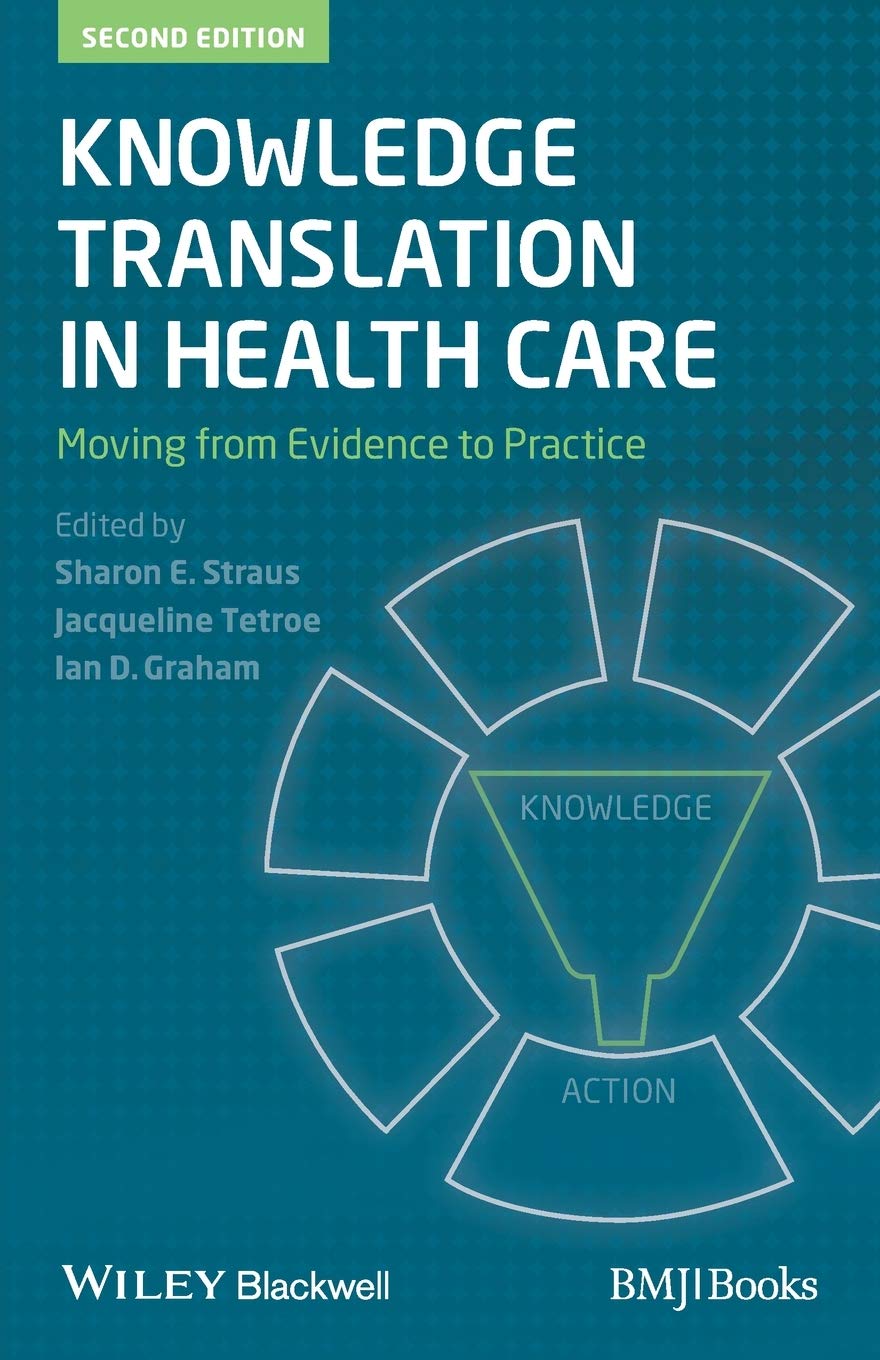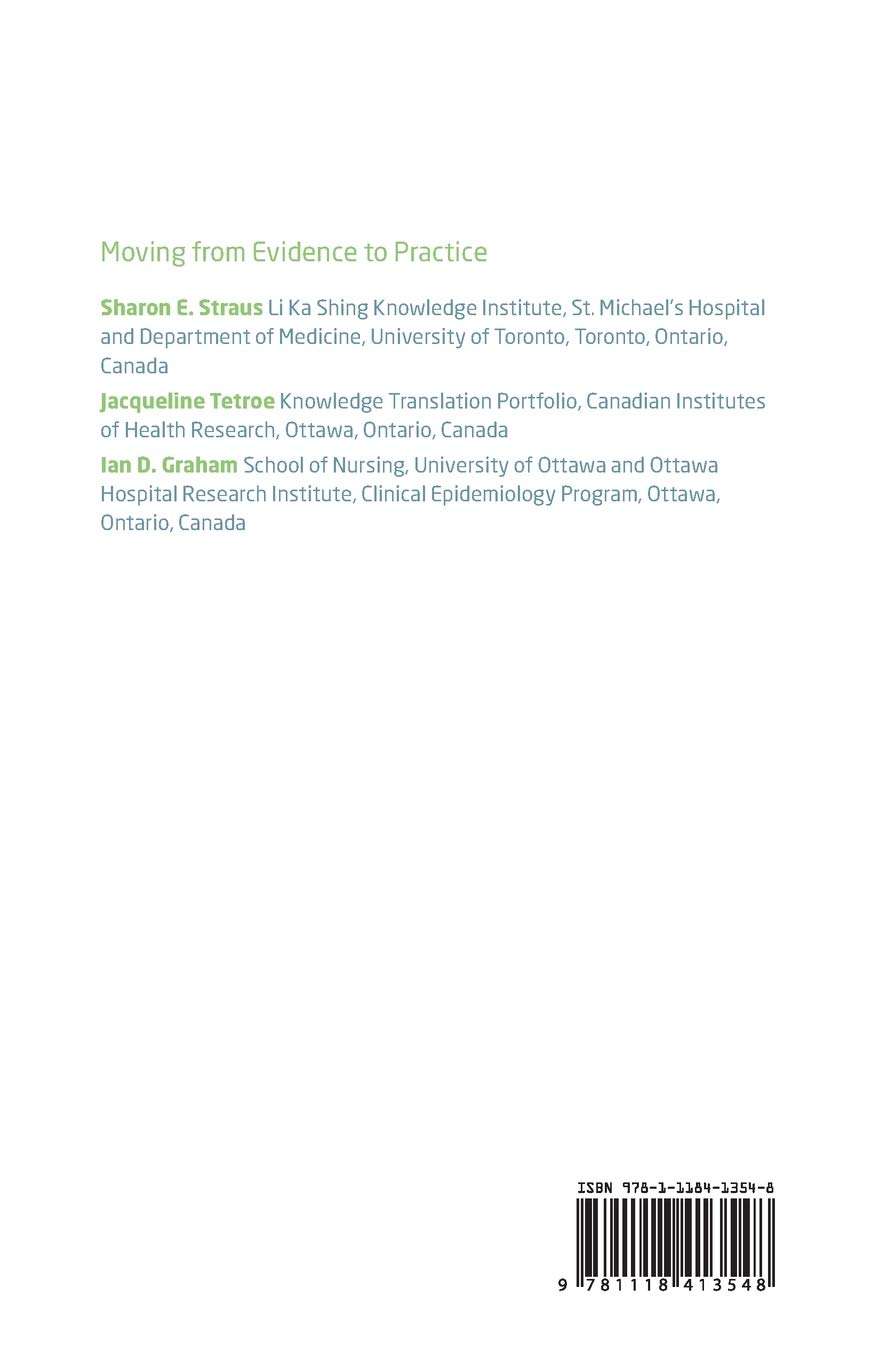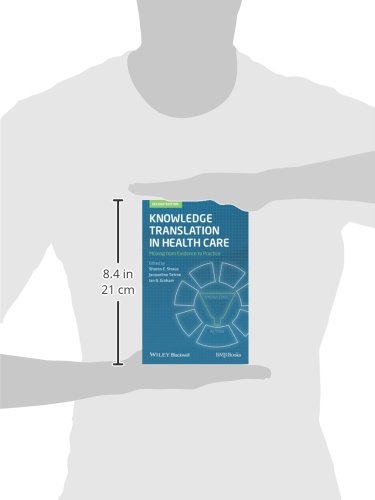Customer Services
Copyright © 2025 Desertcart Holdings Limited




Full description not available
A**R
Book arrived quickly and in good condition
The book arrived quickly and in stated condition
L**F
It's a textbook
Took a long time to arrive. It's a textbook for a course. I am enjoying the book and the course.
D**S
Something seems wrong with this whole process
I want to write a thorough and fair review of this book, but I should warn you my conclusions are unfavourable to this book and more particularly to the field of work behind this book. I shouldn't feel like this- I am a practising doctor- I am sure that individually and as part of the wider healthcare system I, and we, could do better, and that knowledge translation should be part of my, and our, improvement efforts. I have myself written towards that goal in The New GP's Handbook: How to Make a Success of Your Early Years as a GP and How to Get Through Revalidation: Making the process easy And yet the more I read this book the more frustrated I became with its approach, and the more I felt it presents well a rather flawed idea of progress and system improvement.To start with the positives the book is well printed and presented. It brings together many experts from around the world in the field of knowledge transfer and implementation science. It allows them enough space to describe their ideas and their suggested areas for further research. The chapters are classic well written academic prose and well referenced. I believe the book summarises well the field of knowledge translation in healthcare. So if you are working in this field , or are wanting to know more about it, you will find the book a good summary of key ideas in the field.And for the very reason that improving the standard of medical services is so important I need to be very clear about what I think are the flaws in this book and the reasoning behind it, and why I react against them. I do want good medical services for patients, that are effective, safe and accessible. I want good professionals to work in them, and to enjoy providing good service to patients. I don't know any doctor or nurse who wouldn't want this. I just do not feel that this field of research has much to offer me as a practising doctor. I need to say why I feel this.The knowing-doing gap has been known about for many years. The classic joke was the Earl of Rochester's about King Charles the Second,"We have a pretty witty king,And whose word no man relies on,He never said a foolish thing,And never did a wise one"King Charles's response matched it, "that's true, for my words are my own, but my actions are those of my ministers"This book is about the knowing-doing gap, but I suspect it is not aware of the gaps it actually needs to cross. I don't think it knows where the gaps are, are what they consist of. I think it overvalues knowledge over praxis, and it tends to paint a view of life in which flaws in systems are the result of a lack of knowledge that need to be overcome. I just don't think this is a complete representation of the reality and experience of most clinical healthcare workers. I don't believe most of the problems I encounter in myself or others are a result of ignorance, or could be corrected by more guidance and accountability for using it. I do not believe I can be governed or guided into good practice, and I'm not sure the assumption that most healthcare workers are slightly wayward and misguided or misinformed is a good basis to start from. In fact the very idea that deviance from guidelines is, or even could be, a measure of clinical performance is such a crude and instrumental view of clinical practice that it leaves me as a doctor cold. Medicine is not about compliance is it? It's about passion, compassion, knowledge and action coming together. It's about an internal drive (that yes needs to be trained and directed well) to good for others. But when you assume such a powerful professional drive is suspect then you will get practising doctors and nurses offside with you. Or in Raymond Tallis's memorable phrase you reduce doctors to "sessional functionaries robotically following guidelines." (Hippocratic Oaths: Medicine and Its DiscontentsIn this information age the problem is rarely lack of knowledge or lack of information sources. If you look at patient safety incidents or at GMC cases or similar ( e.g. Avoiding Errors in General Practice: Clinical Cases and Medico-legal Issues (AVE - Avoiding Errors) and Patient Safetyit is very rare that a lack of knowledge is the primary risk to the patient. Wilful blindness, as shown up by Robert Francis in the Mid Staffordshire enquiry , and other cognitive flaws]are common- in doctors as in others. Nearly always some procedure has not been observed, some communication has not happened, some information has been ignored or misplaced. Mistakes are made by good and experienced professionals in many fields, and when you read something like James Reason's book The Human Contribution: Unsafe Acts, Accidents and Heroic Recoveries you start to appreciate what front line staff are actually doing, and how different it is from the academic theory or the board level view. And just how much knowledge and skill goes into good professional practice, which is a property of professionals and their professions, not a guideline-which stands in relation to human knowledge rather like a hand rail to a huge building.Nor do I believe that knowledge should need "translation." What language is knowledge written in? Why do I need it translating for me? If it is so badly written that it needs translating why do we support the processes that generates it? If it isn't written in clear language what are the authors trying to hide? Some of the authors in this book are wrapped up in their own linguistic fog, and being brutal I had an impression that some ideas were being stretched, rather further than most stakeholders (readers) would hold on for. There's an awful lot of "multi-component models" "scoping" "meaningful collaboration" and my favourite death knell for an academic article is when it calls for "methodological rigour" at which point I have a sudden paroxysm and think of rigor mortis. This pattern of linguistic travail does not fire my imagination. The book rather lacked "pictures and conversation."I think there's a deeper layer still. I'm not sure I trust the people who are scoping out the systematic reviews and synthesising knowledge for me. I'm not sure I trust their fairness or impartiality. I'm not sure I trust them to ask the question I need answering. I am not sure that the knowledge translators actually know what best practice is or have ever really thought about what best practice would be. I'm not sure the concept is fully explored yet. I see guidelines as being a bit Delphic- they get steadily less applicable the closer they get to any particular patient, in whom the general vanishes into the particular. This book seems to have lost the balance that comes from seeing a lot of patients, and dealing with the particularities and peculiarities of patients- which are vaster than guideline writers have ever thought of. Guideline writers seem to take defined problems and refine the answers further. In clinical practice the problem is to even get to a defined problem. Where are the guidelines for dealing with uncertainty? With vague non-specific symptoms that could be due to multiple causes? Or how to cope if you're tired, hungry and stressed? Or when your colleague is difficult? They don't exist, and yet any practising doctor or nurse will realise the difficulties these patients generate, and how little help or guidance we get in managing them. Almost when a problem is definite enough to be described by a guideline it ceases to be interesting. It just becomes a process or pathway to activate. James Willis is very good at describing these aspects of medical practice. Friends in Low Places as is Iona Heath. The importance of narrative is emphasied by John Launer in Narrative-based Primary Care: A Practical Guide. Somewhere in this book the academic narrative is overvalued and the voice of practitioners and patients is lost. This is a book about us, not a warm conversation with us, although some of the case studies mitigate this slightly.Finally I think there's a problem with the view that the problem consists of knowledge being known but not implemented. I think this view that the academics know something, and that lesser mortals just need help to implement this knowledge is flawed. There's also a lot of knowledge amongst those who read and use research. (e.g Between Health and Illness and Tudor-Hart's A new Kind of Doctor" There are many bits of medical practice that are done on habit- sometimes good automation, and sometimes proximate short cutting. Donald Schon in The Reflective Practitioner: How Professionals Think in Action (Arena) describes the distance between the view from the high ground of academic research and the messy swamp of actual professional practice. This book appears to be addressing this gap, but at the end of it I felt the gap between the two was even bigger than when it started. This book feels like it is written from, by and for the academic high ground and barely really meets the swamp of day by day health services. There are some good chapters in it, which show a flicker of realising that real humans might be involved in the processes of change implementation. In too many chapter there was a feeling that there was something that needed to be imparted to others.There isn't in this book a feeling of people coming together to understand each other. I think there's a real flaw in the metaphor of knowledge translation, and that this book rather makes the point about this flaw. There are some useful chapters in this book, and it is a good summary of its field. I think the fact that this is the field at its best shows why so many problems persist, and I think the knowing doing gap is the least of the problems. I have a feeling that some research needs to come alongside day by day clinical care and start from the bottom up. The formal split in workloads and contracting between the academy and the practitioners needs bridging urgently.There are important ideas and principles within this book and if you are in the field it will be helpful to you.For ordinary service provider doctors and nurses I don't think think this book, and the methods it describes, will fire your interest and enthusiasm or help you practically to make the changes you know are needed in your practice.
A**R
Five Stars
good product and condition
A**R
Five Stars
As described, quick shipping.
F**E
Five Stars
If you are serious about KT this is the book for you!
K**S
Fantastic update
No doubt if you are looking at this text you already have, or have read, the first edition. I was pleasantly surprised as so often I find I update my texts to find very little has changed, but in this instance it seems like the whole thing has had an overhaul.Overall, this has been brought up to date to a very high standard, and I recommend it immensely.
D**5
Useful from a market research perspective
As a market researcher working in the field of healthcare research I was very excited to read this book. While it is a very in depth and specific text, it gives an excellent background to an area anyone working in healthcare research should know about. The book walks you through from in introduction of the concept of knowledge transition and through to actions, barriers and methods of implementation. An excellent read.
Trustpilot
1 month ago
1 month ago